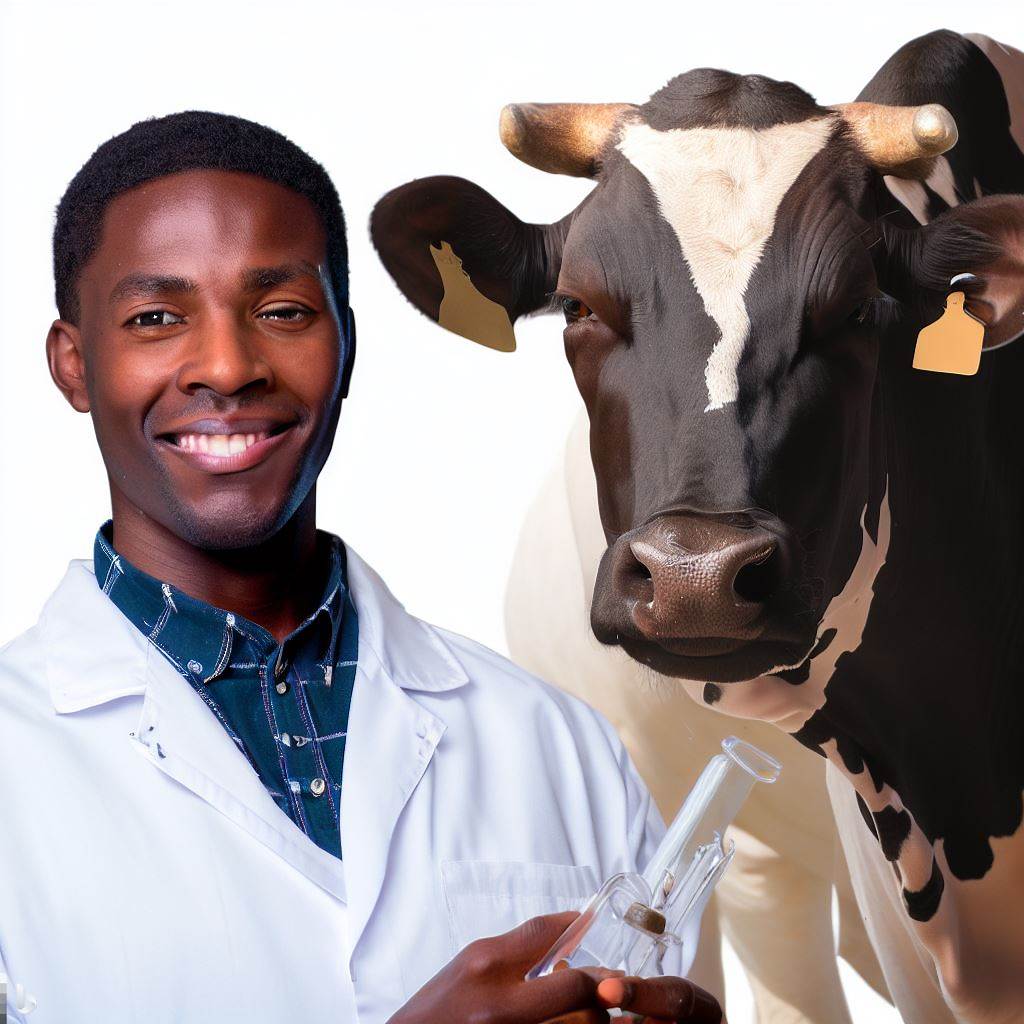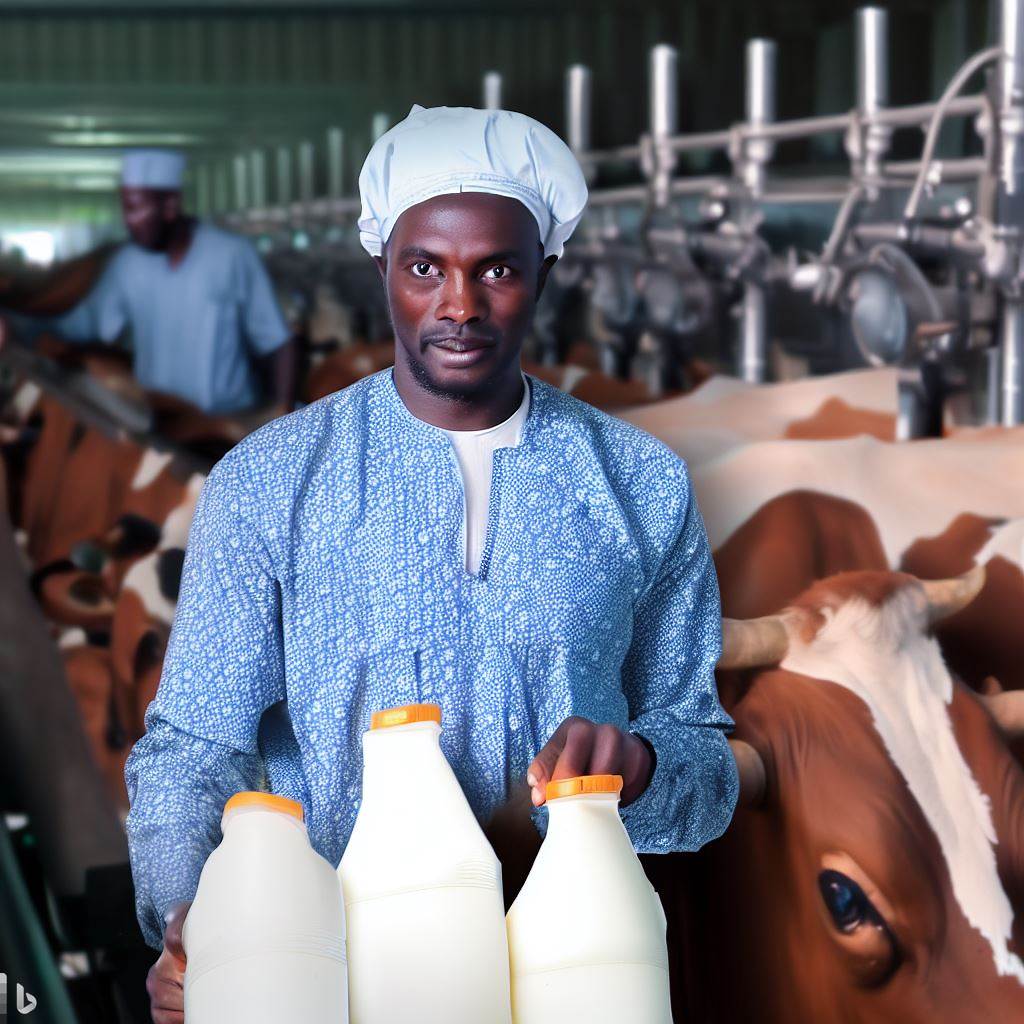Introduction
Animal genetics in Nigeria has shown remarkable progress in recent years, with advancements in breeding and selection techniques.
The importance of animal genetics for agriculture and food production cannot be overstated, as it directly affects productivity and quality.
Animal genetics in Nigeria has undergone a significant transformation in recent years, leading to advancements in breeding and selection techniques.
These developments have helped improve livestock production, leading to increased productivity and better-quality products.
Animal genetics play a crucial role in enhancing the efficiency and sustainability of agriculture and food production.
Nigeria, being an agricultural-based economy, heavily relies on livestock for its food supply and economic development.
Importance of animal genetics for agriculture and food production
Thus, the application of genetic principles and techniques has become essential in meeting the growing demand for animal-derived products.
By selecting breeding animals with desirable traits, such as high milk production, disease resistance, and improved meat quality, Nigerian farmers can optimize the genetic potential of their livestock.
This not only ensures better animal health and welfare, but also maximizes productivity and profitability in the agricultural sector.
In addition, animal genetic advancements contribute to addressing food security challenges in Nigeria. With a fast-growing population, the demand for protein-rich foods is increasing.
Genetically improved livestock can help address this demand by producing more meat, milk, and eggs efficiently.
Moreover, animal genetics also offer sustainable solutions for livestock farming in Nigeria.
By selectively breeding animals with characteristics suited to the local environment, such as heat tolerance and resistance to local diseases, farmers can reduce the need for expensive inputs like medicines and feed supplements, thus promoting a more sustainable and cost-effective farming system.
In the end, the future of animal genetics in Nigeria holds great promise for the agricultural sector.
By leveraging advancements in breeding and selection techniques, Nigerian farmers can improve livestock productivity, enhance food security, and promote sustainable farming practices.
Embracing animal genetics is key to ensuring a thriving and efficient livestock industry in the country.
Current State of Animal Genetics in Nigeria
A. Overview of the types of livestock and breeds found in Nigeria
Nigeria is a diverse country with a rich agricultural heritage, and this includes a wide variety of livestock breeds.
Cattle, goats, sheep and poultry are some of the main types of livestock found in Nigeria. Within these categories, there are various indigenous breeds that have adapted to the local environment over the years.
For cattle, the most common breeds include the White Fulani, Sokoto Gudali, and Red Bororo. These breeds are known for their ability to thrive in Nigeria’s tropical climate and their tolerance to diseases.
In terms of goats, breeds such as the West African Dwarf, Sahel, and Pygmy are popular due to their resilience and excellent meat production.
When it comes to sheep, breeds such as the Uda and Balami are favored for their adaptability and high-quality wool.
As for poultry, the Fulani, Nigerian local, and Nigerian indigenous breeds are notable for their meat and egg production capabilities.
B. Challenges faced in animal breeding and genetics
Despite the potential of animal genetics in Nigeria, there are numerous challenges that hinder its progress and development.
1. Lack of genetic information and data
One major obstacle is the lack of comprehensive genetic information and data on Nigeria’s indigenous livestock breeds.
This dearth of information makes it difficult to understand and improve the genetic traits of these breeds, hindering their overall growth and productivity.
2. Inadequate infrastructure and facilities
Another challenge is the limited infrastructure and facilities for animal breeding and genetics.
Many farms and research institutions lack the necessary equipment and resources to effectively carry out breeding programs and research initiatives.
This deficiency hampers the collection of accurate data and slows down progress in the field.
3. Limited access to advanced breeding technologies
Nigeria also faces a limited access to advanced breeding technologies. Techniques such as artificial insemination, in vitro fertilization, and embryo transfer are not widely available or utilized in the country.
This limits the ability to improve livestock genetics and increase productivity through selective breeding.
4. Insufficient funding for research and development
Lastly, inadequate funding for research and development in animal genetics is a significant challenge.
Many research institutions and organizations struggle to secure the necessary financial support to carry out extensive breeding programs and genetic studies.
This lack of funding hinders the exploration of potential advancements in animal genetics and limits progress in the field.
In fact, the current state of animal genetics in Nigeria is marked by the presence of diverse livestock breeds, but hindered by several challenges.
The lack of genetic information, inadequate infrastructure and facilities, limited access to advanced breeding technologies, and insufficient funding for research and development all contribute to the slow progress in this field.
Addressing these challenges is crucial for the future of animal genetics in Nigeria, as it has the potential to greatly boost livestock productivity and promote sustainable agriculture in the country.
Read: Animal Geneticist: Nigeria’s Answer to Food Security?
Potential Benefits of Improving Animal Genetics in Nigeria
A. Enhanced productivity and profitability in livestock farming
Improving animal genetics in Nigeria can lead to increased productivity and profitability in livestock farming.
Through selective breeding and genetic improvement, farmers can enhance desirable traits such as growth rate, milk production, and meat quality, leading to higher yields and better profits.
B. Improved disease resistance and reduced health risks
By focusing on animal genetics, Nigeria can develop livestock breeds that are more resistant to common diseases and health risks.
This can reduce the need for expensive medications and vaccinations, resulting in cost savings for farmers and a healthier livestock population.
C. Conservation and preservation of indigenous livestock breeds
Nigeria is home to several indigenous livestock breeds that are adapted to local environmental conditions. By improving animal genetics, these breeds can be preserved and not replaced by exotic breeds.
This conservation effort helps maintain biodiversity and protects the cultural heritage associated with indigenous livestock breeds.
D. Increased food security and economic growth
Improving animal genetics in Nigeria contributes to increased food security and economic growth.
With enhanced productivity and efficiency in livestock farming, there will be a higher availability of animal-based products such as meat, milk, and eggs, ensuring food sufficiency for the population.
Moreover, the livestock sector can contribute to job creation, income generation, and overall economic development in the country.
Overall, investing in animal genetics in Nigeria holds great potential for various benefits.
By focusing on enhancing productivity, improving disease resistance, conserving indigenous breeds, and increasing food security, the country can pave the way for a sustainable and profitable livestock industry.
Read: A Day in the Life of a Nigerian Animal Geneticist

Strategies for the Future of Animal Genetics in Nigeria
The future of animal genetics in Nigeria holds great promise for the improvement of livestock breeds and the overall agricultural sector.
To ensure a successful future, it is essential to implement strategic measures aimed at strengthening research and development efforts, establishing a reliable national gene bank, and investing in capacity building.
These strategies will contribute to the advancement of animal genetics and foster sustainable agricultural practices in Nigeria.
A. Strengthening research and development efforts
Establishing collaborations with international institutes and experts can significantly enhance the knowledge and expertise in animal genetics in Nigeria.
By partnering with renowned institutions and experts, researchers in Nigeria can benefit from shared resources, advanced technologies, and exposure to cutting-edge research.
Setting up genetic research centers and laboratories will provide the necessary infrastructure and facilities for conducting extensive studies on animal genetics.
These research centers can serve as hubs for collaboration, innovation, and the development of practical solutions for genetic improvement in livestock.
B. Developing a reliable national gene bank for livestock
Collecting and preserving genetic materials from different breeds is crucial for maintaining genetic diversity and preventing the loss of valuable traits.
Establishing a comprehensive national gene bank will serve as a repository for genetic resources, ensuring their long-term preservation and availability for future breeding programs.
Implementing strict quality controls and standardized protocols in the management of the national gene bank will guarantee the integrity and reliability of the stored genetic materials.
This will involve rigorous documentation, proper storage conditions, and regular monitoring to ensure the viability of genetic resources.
C. Investing in capacity building and professional training for researchers and farmers
Promoting education and awareness about animal genetics is essential for building a knowledgeable and skilled workforce in Nigeria.
Training programs, workshops, and educational campaigns can be organized to disseminate information and foster a culture of understanding and appreciation for animal genetics among researchers and farmers.
Providing financial incentives for undertaking genetic improvement programs can motivate researchers and farmers to actively participate in genetic research and implementation.
Grants, subsidies, and rewards for achieving genetic improvement targets can encourage individuals and organizations to invest their time, resources, and efforts in genetic enhancement initiatives.
By adopting these strategies, Nigeria can position itself as a leader in animal genetics, contributing to the sustainable development of its livestock industry.
The collaboration with international institutes, the establishment of a reliable national gene bank, and the investment in capacity building will pave the way for improved livestock breeds, increased agricultural productivity, and a more prosperous future for Nigeria’s agricultural sector.
Read: Role of Animal Geneticist in Nigeria’s Agro-economy
Government Policies and Interventions
A. Encouraging private sector investments in animal genetics
The Nigerian government should actively encourage private sector investments in animal genetics. This can be done by providing incentives such as tax breaks and access to low-cost financing.
B. Providing grants and subsidies for farmers and researchers involved in genetic improvement
To promote animal genetics in Nigeria, the government should offer grants and subsidies to farmers and researchers who are actively involved in genetic improvement programs.
This will help offset the high costs associated with research and development in this field.
C. Formulating and implementing regulations for the responsible use of genetic engineering techniques
It is crucial for the government to establish clear regulations regarding the use of genetic engineering techniques in animal genetics.
These regulations should ensure the responsible and ethical use of these technologies to prevent any potential risks to animal welfare and the environment.
D. Establishing a national policy framework for animal genetics in line with global standards
Nigeria should develop a comprehensive national policy framework for animal genetics that aligns with global standards.
This framework should include guidelines on breeding practices, genetic testing, and the protection of intellectual property rights. It should also address issues related to biosecurity and bioethics.
By implementing these government policies and interventions, Nigeria can effectively harness the potential of animal genetics for its agriculture sector.
Encouraging private sector investments will attract expertise and resources to further develop the field.
Providing grants and subsidies will enable farmers and researchers to actively participate in genetic improvement programs, leading to improved livestock productivity and sustainability.
Formulating and implementing regulations will ensure the responsible use of genetic engineering techniques, minimizing any potential risks and maximizing the benefits of these technologies.
Establishing a national policy framework will provide guidance and direction, ensuring that animal genetics in Nigeria are in line with global standards and best practices.
Overall, these government policies and interventions will help shape the future of animal genetics in Nigeria, enhancing the nation’s livestock industry and contributing to food security and economic growth.
Read: Inspiring Stories of Nigerian Animal Geneticists
Conclusion
Animal genetics plays a crucial role in enhancing the productivity and sustainability of Nigeria’s agricultural sector.
With advancements in technology and increasing awareness, Nigeria has the potential to become a leader in animal genetics research and development.
All stakeholders – government, researchers, farmers, and investors – must unite, prioritize animal genetics, and unleash Nigeria’s agri sector.




